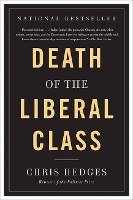The liberal class plays a vital role in a democracy. It gives moral legitimacy to the state. It makes limited forms of dissent and incremental change possible. The liberal class posits itself as the conscience of the nation. It permits us, through its appeal to public virtues and the public good, to define ourselves as a good and noble people. Most importantly, on behalf of the power elite the liberal class serves as bulwarks against radical movements by offering a safety valve for popular frustrations and discontentment by discrediting those who talk of profound structural change. Once this class loses its social and political role then the delicate fabric of a democracy breaks down and the liberal class, along with the values it espouses, becomes an object of ridicule and hatred. The door that has been opened to proto-fascists has been opened by a bankrupt liberalismThe Death of the Liberal Class examines the failure of the liberal class to confront the rise of the corporate state and the consequences of a liberalism that has become profoundly bankrupted. Hedges argues there are five pillars of the liberal establishment - the press, liberal religious institutions, labor unions, universities and the Democratic Party- and that each of these institutions, more concerned with status and privilege than justice and progress, sold out the constituents they represented. In doing so, the liberal class has become irrelevant to society at large and ultimately the corporate power elite they once served.

